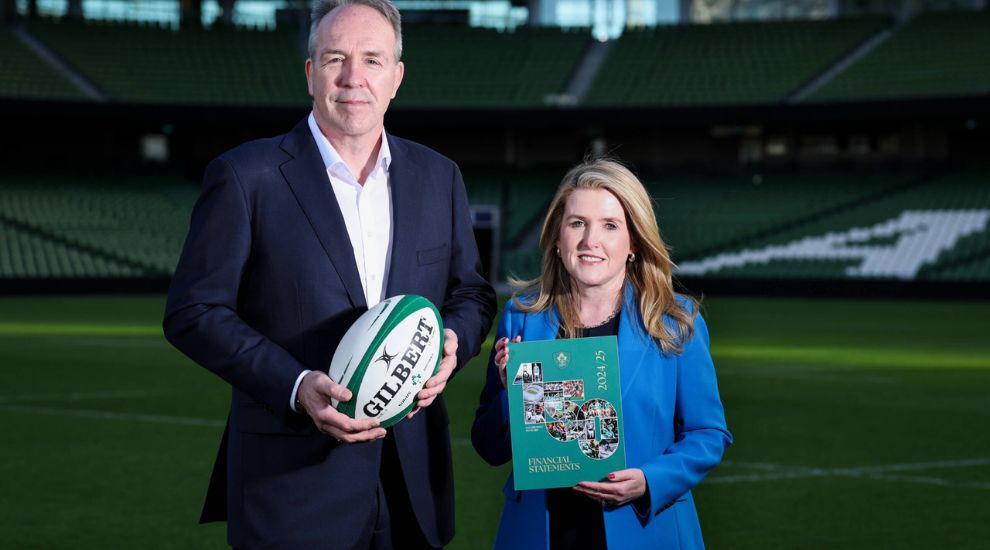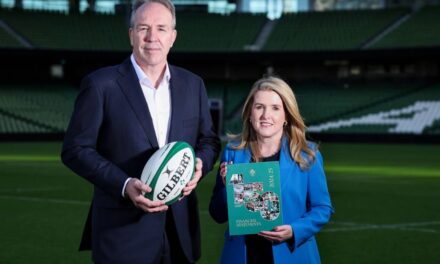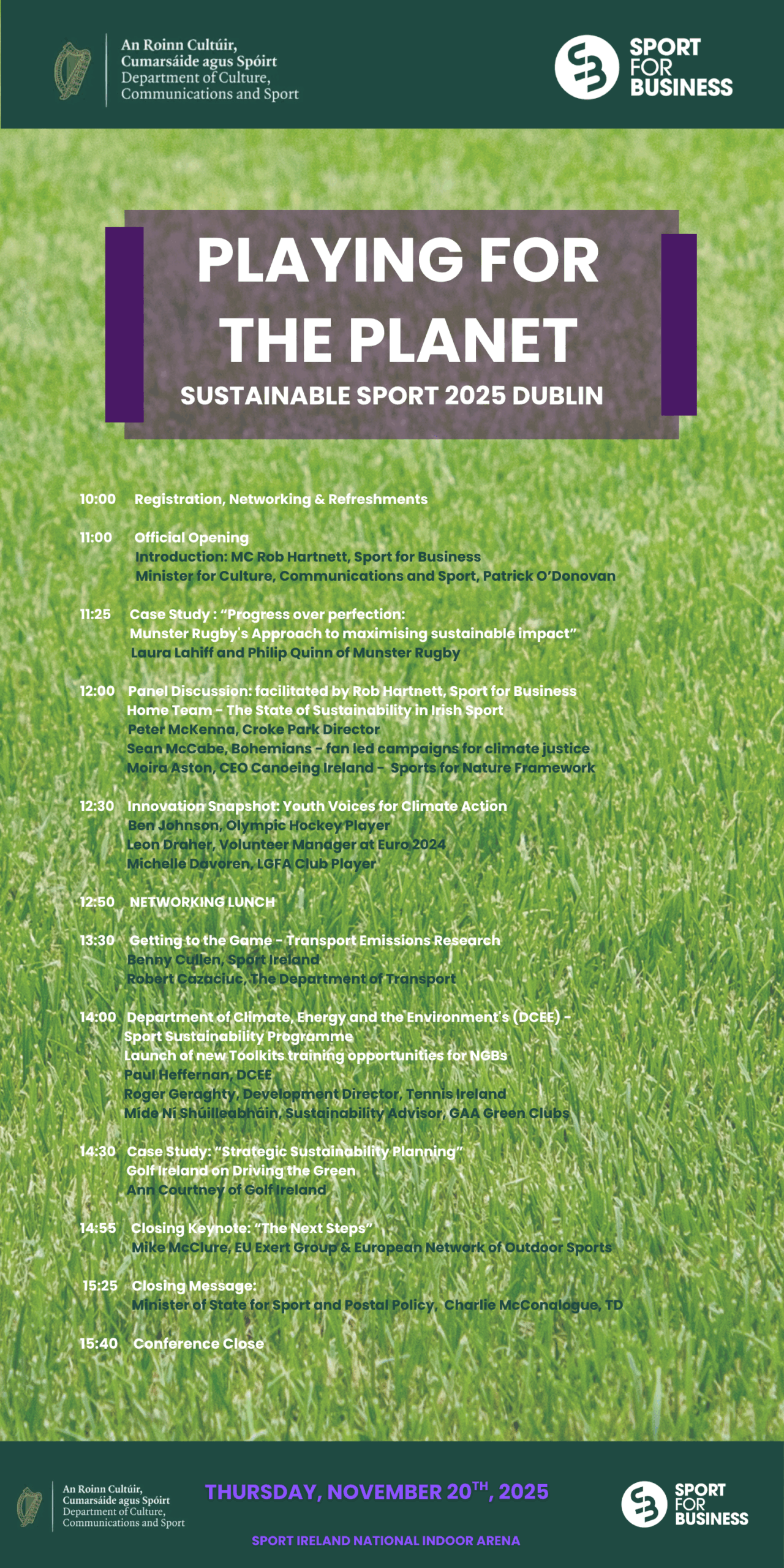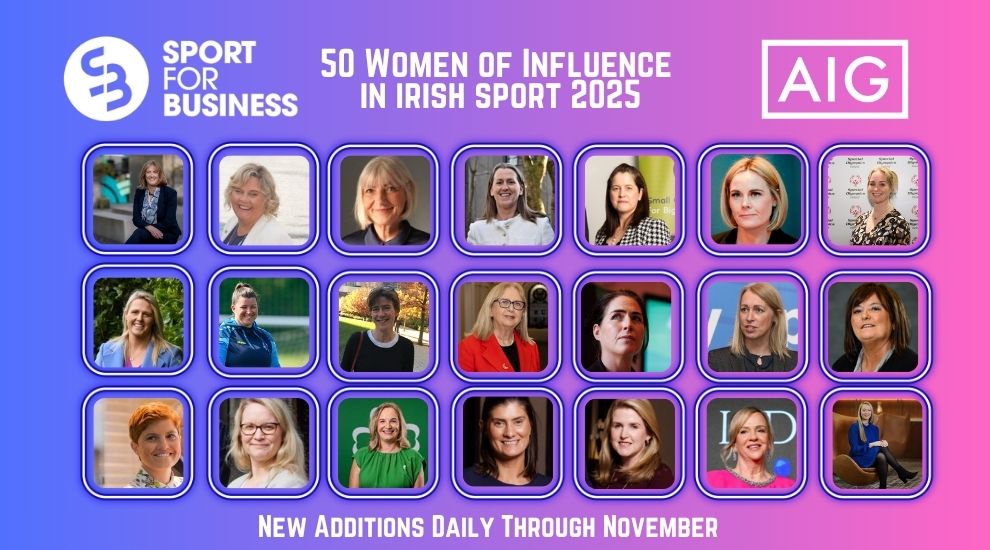Kevin Potts and Thelma O’Driscoll walked into the IRFU Suite yesterday to face a collection of seven journalists ready to explore the Annual Financial Accounts of the Union.
It is far from the post-match press conference or the Captains run, but as quickly became apparent, it is of vital importance, arguably more than the result of any one game.
The basic message was that Irish rugby is financially “fairly solid”, but only if the game can learn to live within its means.
The IRFU’s latest accounts show an operating deficit of €4.2 million, sharply down from the €18 million reported last year. Yet the union’s chief executive and chief financial officer were clear that the underlying challenge hasn’t gone away.
“We’re in a fairly solid position. We’ve managed our finances pretty well over the decades,” said Kevin Potts, chief executive of the IRFU. “We don’t have any debt, and we have cash reserves of €62 million… but the challenge the game faces is sustainability on an annual basis.”
Strong balance sheet, fragile margins
On paper, the numbers look reassuring. The IRFU has no debt and net assets of €81.6 million.
Cash reserves of €62.6 million – largely money paid up-front by 10-year ticket holders – give Potts and O’Driscoll some room to manoeuvre.
But that cushion can be deceptive.
“The reason we’ve €62.6 million is that’s our 10-year tickets taken in up front,” explained Thelma O’Driscoll, the IRFU’s chief financial officer. “That reserve isn’t free money – it’s all committed future income, released into the accounts year by year.”
Strip out non-cash depreciation and exceptional costs, and the cash deficit is closer to €0.5 million. Still, over a four-year Rugby World Cup cycle, the IRFU has racked up cumulative losses of close to €30 million, largely driven by the season in which the traditional November Autumn Internationals disappear in favour of a World Cup.
In that context, Potts said breaking even – not making a profit – is the strategic goal.
“We’re not in the business of making profits. Everything goes back into the game,” he said. “Next year, because of the Chicago game and a very successful Lions tour commercially, we’re confident we will break even, but then the following year, the same challenge.
In 2027 we have another Rugby World Cup, so we lose the autumns and we have that challenge again.”
Sevens cut, €5m savings target
The most visible “tough call” already taken was the axing of the men’s sevens programme, a move that has drawn criticism from within the game.
On Wednesday, Potts put a number on it.
“The men’s sevens programme saved €1.2 million net,” he said. “That enabled us to invest additional funding into our women’s fifteens programme and is already helping programmes that are now active in the male pathways in Munster, Connacht and Ulster.”
But more is coming.
“Straight up, we need to reduce our cost base by approximately €5 million,” he said. “Because we have a robust balance sheet it’s not urgent – we can transition over the next 18 months – but by the beginning of 2027–28 we should have an annualised saving package of roughly that amount.”
O’Driscoll described a painstaking cost review. “Everything has been questioned. We cut the men’s sevens, which was a big call, but there are no other big-ticket items – it’s squeezing every single line. We were already a reasonably lean organisation.”
Around half of the savings, Potts hopes, can come from administration – new accounting, HR and procurement systems, shared purchasing with provinces – but he was blunt that the rugby side will not be untouched.
“We will need to find something across rugby,” he admitted. “If you talk to high-performance people the response is, ‘You’ll risk performance.’ On the development side, you impact participation programmes. Anything we look at is a challenge.”
Ticket prices, “corporate day out” and the Aviva debate
If cost-cutting is one side of the equation, raising revenue is the other – and that is where the IRFU is drawing the most public fire.
Category A tickets for Tests at the Aviva now reach €160, an increase of roughly 80 per cent over 12 years.
“Ticket pricing is critical to us,” said O’Driscoll. “We have five or six games every year that we have to maximise our revenue on, but at the same time we need to balance that with affordability for fans.”
She stressed that prices were benchmarked against other unions and sports by an external consultant, and that an internal committee structure now sits over ticketing. “Yes, they sound expensive, but we do have to push the revenue on these games and we’re comfortable with where they’re sitting.”
Potts pushed back strongly at the familiar accusation from one of the journalists present that Aviva internationals have become a “corporate day out”.
“You keep using that phrase corporate day out. I don’t agree that it’s a corporate day out,” said Potts. “The majority of our tickets go to our clubs… To be constantly calling it a corporate day out, I don’t think it’s fair to the fans who are there.”
He insisted ticket allocations to provinces and clubs are unchanged since the Aviva opened in 2010, and said he believes similar numbers still travel from rugby heartlands like Limerick, Galway, Cork and Belfast.
On whether the union should sacrifice some value in the Aviva naming-rights deal in order to free itself to play more often at 82,300-capacity Croke Park, Potts was unequivocal.
“This is the home of Irish rugby,” he said.
Chicago complaints and the US growth gamble
The controversial return to Soldier Field in Chicago – heavily criticised by travelling supporters for its poor stadium experience and TV production – came up.
Potts acknowledged “definite failings” in the match-day production but stressed that the wider US strategy remains central to the union’s plans.
“There were definitely failings in Soldier Field which we all saw,” he said. “But the game itself in terms of the match-day revenue would be on a par with what we would generate here. What entices you there is what you can do off the pitch… the discussions and coming together of people who might have interest in supporting Irish rugby or New Zealand rugby, and events run on behalf of various governments.”
Earlier reports had suggested a possible annual Ireland–New Zealand fixture in America; Potts clarified that the aim is annual games in the US, not necessarily against the All Blacks, as part of World Rugby’s strategy to grow interest before the men’s and women’s World Cups in 2031 and 2033.
Crucially, he said US games would be “additive” – a fourth Test rather than a replacement for a full house at the Aviva – thanks to Ireland’s central contracting model, which offers flexibility outside Regulation 9 release windows.
Betting on the Nations Championship and broadcast “green shoots”
If there is one area where Potts is more upbeat than in previous years, it is broadcasting.
“The values of broadcast have stagnated and fallen back for rugby over the last five or six years,” he said. But he now sees “green shoots” linked to the new Nations Championship, which will sit alongside the Six Nations and Rugby Championship in the global calendar.
“I’m more optimistic,” he said. “The whole reason we need to look at something different in relation to the Nations Championship is to improve broadcast values. The narrative that every fixture matters, destination finals, innovation around the games – we believe it will attract more fans and engage younger audiences.”
He conceded there is “a balance between tradition and generating revenue,” and admitted as a lifelong rugby fan he loves three-Test summer tours. “But we have to make a change, otherwise we’re not going to be able to generate the revenues the game needs in the professional era.”
Women’s game and the domestic footprint
One of the more striking numbers in the accounts is the €9.4 million invested in the women’s game – up €1.1 million year-on-year and more than quadruple the level in 2020–21, a figure that has drawn praise even as questions persist about where the money comes from.
“We could probably allocate about €4 million of revenue to it,” said Potts. “The home games we’re hosting in Ireland are beginning to generate a profit, but investing in the women’s game is still a requirement for the medium and long term.”
He was frank that €9.4 million is “probably the maximum the IRFU can invest” from its own resources for now; further growth will need government and commercial backing.
On the grassroots side, the union spent €14.2 million on domestic and community rugby – up around 18 per cent – plus €2 million in one-off grants, much of it co-funding development officers with the provinces and supporting infrastructure projects such as club walking tracks.
It is this web of commitments – elite men, women, and community game – that underpins Potts’s insistence that funding pathways for the men’s XV will continue to take priority, as long as around 80 per cent of total revenue still flows from the national team.
Squeezed from all sides
Against a backdrop of private equity interest, rival concepts such as the proposed World 360 league and a new World Club Championship, and financially distressed leagues elsewhere, Potts portrayed Ireland’s position as relatively robust but far from comfortable.
“We’re constantly looking at ways to make sure we maximise the value of the limited international weekends,” he said. “We work really collaboratively off the pitch and compete on it.”
For now, the story of Irish rugby’s finances is one of a strong balance sheet, shrinking deficits and increasingly hard choices. The union is gambling that Chicago trips, a reimagined global calendar and a booming Nations Championship will bring in the revenue needed to keep the national team at the top table – while supporters at home, staring at €160 ticket prices, decide how much they are willing to pay to keep it that way.
Image Credit: IRFU and Dan Sheridan, Inpho.ie
Further Reading for Sport for Business members:
Read our Sport for Business Coverage of Rugby
SPORT FOR BUSINESS Upcoming Events
December 9th – Our 12th Annual Women in Sport Conference in partnership with Lidl.
January 2026 – The Sporting Year Ahead 2026 in partnership with Teneo – Launching Soon
Sport for Business Podcasts
MEMBERSHIP AND EVENT,
The IRFU and each of the Provinces, as well as sponsors from Vodafone to Guinness and PwC to Aviva, Aldi and Energia to Bank of Ireland are among the many Rugby organisations among the leading sporting and business organisations in and around the world of sport, who are part of the 300+ members of the Sport for Business community.
This includes all of the leading sports and sponsors, as well as commercial and state agencies, individuals interested in our world, and an increasing number from beyond these shores taking a keen interest in Ireland.
Find out more about becoming a member today.
Or sign up for our twice-daily bulletins to get a flavour of the material we cover.
Sign up for our News Bulletins here.
































